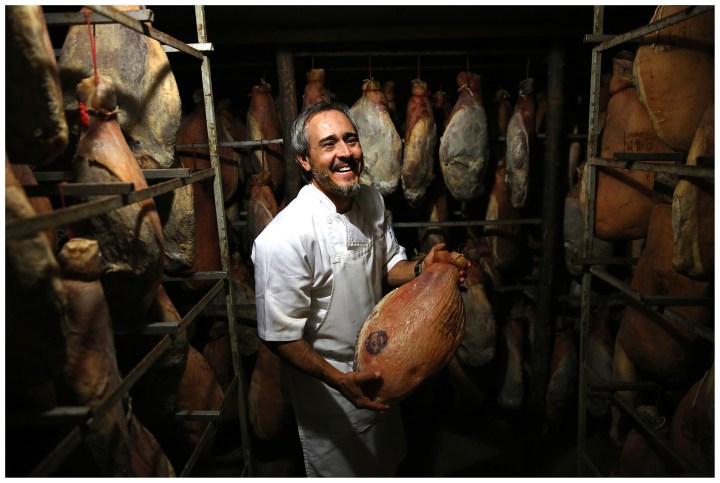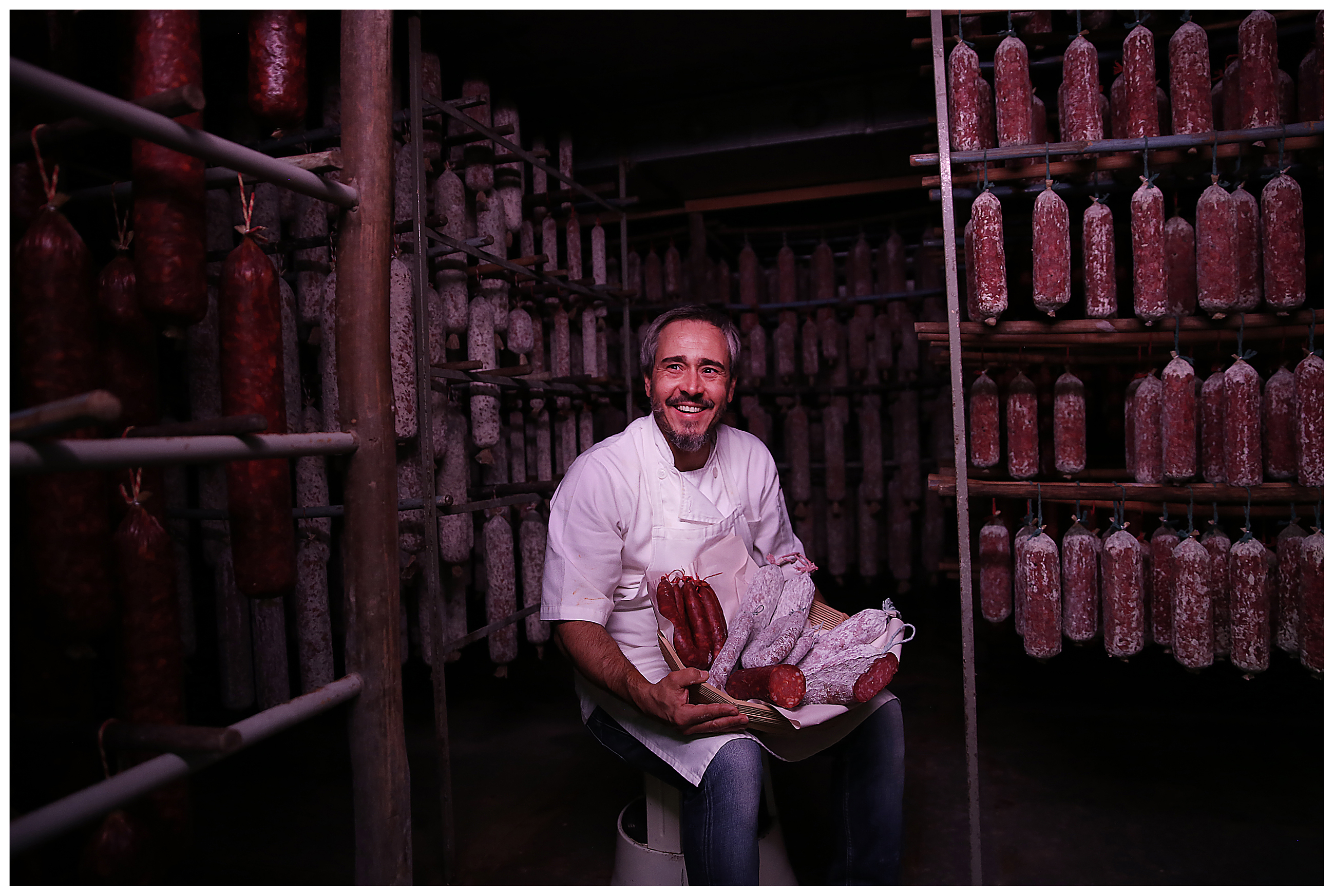JAMONOPOLIS
Inside the Hidden Cave where Jozi’s hams are cured

There’s surely nothing like this in all of South Africa. It’s where time and fragrant hams stand still, in a cave reminiscent of an Aragonian cavern – but in Johannesburg’s Lorentzville.
Cosmopolitan Johannesburg is often ridiculously hard to define, especially just east of the City Centre. Bits crop up that aren’t on all the maps – and Lorentzville is like that. It’s kind of tucked between Bertrams and Judith’s Paarl. Yes, that’s a place on some maps. It’s south of Troyeville but north of somewhere seriously labelled Bellevue Central. Like Judith’s Paarl, it only has one road running the length of it and, in Lorentzville’s case, it is Viljoen Street.
The city loses its urban structure here, a loose tumble of low old factory shells used for something or other and vaguely repurposed homes. Cars park half on and off uneven pavements.
Victoria Yards has spruced up a section, filling old car parts workshops with new arts, crafts, even a lush Eden of fruits and vegetables but all hidden from the rest of the people in Viljoen Street. There aren’t many of those. It’s the Christmas holiday part of the year and local trade has halted. Any energy has been sucked afar already. A man leans against a bricked up doorway not far from the Jamonopolis.
Across from the Jamonopolis is a house that once sold kotas from the front door, the garden weed-filled, featuring a plaster dwarf with a fishing rod round the corner from a shapely Naiad pouring plaster water from an urn. Both of them have startling black eyelashes painted around their blank eyes.
But here you realise, with iron gates and buzzing electronic security before you get inside, that things are different. Delivery vans and couriers load boxes constantly under cameras. The real clue is the sign above the entrance reading: Bienvenidos a la Jamonopolis de Johanesburgo. It’s accompanied by cartoon images of a barrel-shaped pig and what seems to be a gammon leg, fading a little.
Roberto Sa Jiminez, perhaps with a smile, would have had that sign written 30 years ago, when he started the business in Viljoen Street. I’d often heard in the decades that followed about a Spanish cured meats magician who made “really real” Serrano hams and there was also a person who sold my favourite Italian fennel salsiccia “somewhere near the Troyeville Hotel”. They both turned out to be Señor Sa Jiminez but I hadn’t found his premises yet.
When Roberto Sa Giminez brought his parents’ and grandparents’ and much older family traditions of Serrano ham curing from the Aragonian part of the Pyrenees, he brought it to the perfect place with ideal conditions, even within a city, Joburg being 1,700m above sea level. His handmade cured meats, salamis, sausages and bacon quickly became renowned among merchants and consumers in the know, but his hand-cured hams were legendary. The real name of his business was Fama. The name came true of course and lives on as a meticulous continuation. Sa Giminez still visits his erstwhile business once a week or so and has been doing so for the nine years since he passed it on to Nuno and Carla Fernandes, whose own earlier people were just over the Pyrenees from the Sa Giminez people.
“It is all about using the right ingredients, sticking to the time-honoured methods and working in a suitable environment. What we do is not very different from what my ancestors did,” is what Roberto Sa Giminez said and can still truly say when he hangs out with his coffee and ham sandwich, with Nuno.

Nuno Fernandez with some of Fama’s other cured meat products. Photo: Alon Skuy, The Times. Republished with permission of the proprietor.
We South Africans love Christmas gammons as much as the Europeans. Sometimes ours have a distinctly local slant. We’re probably over the hot gammons studded with Hawaiian pineapple rings encircling glacé cherries but we have come to favour boiling the already salted (certainly not Fama’s 12-month-cured Serranos) gammon in ginger ale with the Christmassy spices of cinnamon, nutmeg and cloves and glazing the lot with orange syrup. I suppose the gammon that is boiled in Coke then glazed with Klippies and apricot jam could take the tuisnywerheid Christmas cake.
Spanish gammon traditions took hold during the time of the Moorish conquest of Spain. The Roman Catholic Spaniards considered eating gammon on religious days, especially like Christmas ones, as a sign of resistance to their Muslim conquerors.
Centuries later it is still a tradition, now to buy a whole ham for Christmas and to show generosity by sharing it with friends, family and the hungry. Since there are about five major celebratory Spanish feasts over the Christmas period, it also often finds itself in the first of the traditional four courses. Here such generosity would cost us about R1,800.
But there’s not much that’s nicer than piling up a side plate with a heap of deliciously fine folds of their or our fragrant Serrano jamon and savouring it with a glass of dry, almondy sherry. Or maybe even that Klippies. Luckily we can also buy smaller sections of these superb hams from Fama and shave them thinly. No need to boil in ginger beer. Serve as delightfully is.
Beyond the Fama deli where all the justifiably named wares are available, is this space within, where seemingly nothing happens for true slowness. Hams hang around here for a whole year, having been packed in salt and dried first, before being spread with lard and hung in cool, dark silence. “While we let osmosis do its thing,” as Nuno says, coming out into the light. He is, not surprisingly, a member of the international Slow Food Movement.
Who wants to jostle with people in the shopping centres at this time of year in the metropolis? I prefer the company of cool, slow hams and I love it in here. I can escape to the days of ancient Iberia. It’s dark and humid, cavern-cool, filled with shadowy shapes. In the vast dimness I brush up against a huge body, veer a little and thump into another. It swings slowly, one of maybe 2,000 surrounding me. The smell is almost overwhelmingly delicious, the uniquely savoury sweetness of curing Serrano hams.
Just a chamber away in reality, this jamonopolis of gourmand wonders seems a whole other city away in time and place from exhausted Viljoen Street. DM
Fama Delicatessen Products, 12 Viljoen St, Lorentzville 011 618 3048





 Become an Insider
Become an Insider